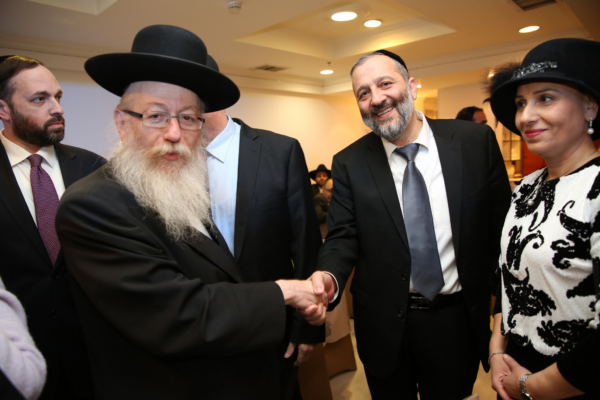File Photo Aryeh Deri (right), leader of Shas, with United Torah Judaism’s Yaakov Litzman, at a “Sheva Brachot” event for Deri’s daughter, soon after her marriage in Jerusalem, December 23, 2015.
Yaacov Cohen/Flash90, shows Aryeh Deri (right), leader of Shas, with United Torah Judaism’s Yaakov Litzman, at a “Sheva Brachot” event for Deri’s daughter, soon after her marriage in Jerusalem, December 23, 2015.Yaacov Cohen/Flash90, shows Aryeh Deri (right), leader of Shas, with United Torah Judaism’s Yaakov Litzman, at a “Sheva Brachot” event for Deri’s daughter, soon after her marriage in Jerusalem, December 23, 2015.
Israeli Prime Minister Benjamin Netanyahu’s biggest coalition partner said on Tuesday it would support a prospective deal to free hostages from Hamas captivity even if it entails an overhaul of Israel’s Gaza war strategy.
The statement by Shas, an ultra-Orthodox Jewish party that holds 11 of parliament’s 120 seats, followed similar remarks on Monday by Yitzhak Goldknopf, leader of the second such party in the coalition, United Torah Judaism, which has seven seats.
“Our position is that there is nothing greater than the value of life and the commandment to redeem captives, because their lives face a real and present danger,” Goldknopf, Israel’s housing minister, said in a statement.
Similarly citing a religious obligation, Shas pledged “full support” to the proposal. It encouraged Netanyahu and his war cabinet to “withstand all pressures for the end of returning the hostages”.
The combined support of the two parties – which hold 18 of the 72 seats controlled by Netanyahu’s expanded emergency government – could help offset opposition by far-right partners to a U.S.-backed proposal for winding down the Gaza war.
The deal’s opponents – the Jewish Power party of National Security Minister Itamar Ben-Gvir and the Religious Zionism party of Finance Minister Bezalel Smotrich – control 13 seats and have threatened to quit the government over the deal.
They worry that the proposal would halt efforts to defeat the Palestinian Islamist group Hamas. Netanyahu has said Israel would not stop the war without toppling and disarming Hamas – while Hamas insists that any deal must end the Israeli offensive against it in Gaza.
Though the Israeli public has rallied around the war triggered by a Hamas cross-border killing and kidnapping spree on Oct. 7, support has eroded amid worry for the 120 remaining hostages, more than a third of whom are believed to have died.
According to a poll aired by public broadcaster Kan on Sunday, 40% of Israelis support the ceasefire proposal, which was unveiled by U.S. President Joe Biden last week, while 27% are opposed and 33% undecided.
Forty percent of respondents said they believe that if Israel enters the deal that would spell an end to the war, while 34% predicted a resumption of fighting and 26% were undecided.
Asked if Israel would succeed in toppling Hamas, 32% said yes, 42% said no and 26% were undecided, Kan found.
REUTERS


Leave a Reply
You must be logged in to post a comment.